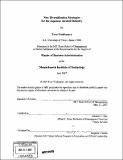New diversification strategies for the Japanese alcohol industry
Author(s)
Yoshimura, Toru, M.B.A. Massachusetts Institute of Technology
DownloadFull printable version (14.53Mb)
Other Contributors
Sloan School of Management.
Advisor
Arnoldo C. Hax.
Terms of use
Metadata
Show full item recordAbstract
Japanese major alcoholic beverage companies, whose businesses are mainly the production and sale of beer products, stand at a strategic crossroads. There are several reasons: a slow decrease in the Japanese population, which leads to a smaller drinking population; diversification of customers' tastes and preferences; a totally saturated beer and low-alcohol beverage market; and a globalization trend that is now entering Asian countries. Therefore it is essential for the alcoholic beverage companies to adopt strategies for future sustainability--one to strengthen its core liquor business and offer a range of beverages other than beer; the other is to expand business opportunities into areas other than the liquor business. These diversified businesses are basically either vertically integrated or founded upon the core competencies, both of which are close to their main business, namely alcohol beverage business. At the same time, other large international beer brewers such as Anheuser-Busch, Heineken, and Lion Nathan, are pursuing a different strategy from the Japanese companies: these competitors are focusing even more on their core beer business. I will explore future strategies for the alcoholic beverage companies. (cont.) I will compare Japanese companies that have diversified their business including the historical backgrounds of diversification and future strategies of other international players. Subsequently, the thesis narrows down to diversification strategies for a Japanese brewing company, Kirin Brewery, which is trying to nurture another pillar for its future growth after almost 30 years of diversification. To evaluate the long- and mid-term business strategies of this new pillar--health foods and functional foods-as a new joint venture, I will apply in some detail the Delta Model Integrated Business Framework proposed by Arnoldo Hax.
Description
Thesis (M.B.A.)--Massachusetts Institute of Technology, Sloan School of Management, 2007. Includes bibliographical references (p. 238-241).
Date issued
2007Department
Sloan School of ManagementPublisher
Massachusetts Institute of Technology
Keywords
Sloan School of Management.